Mick Mulvaney and Gordon Sondland fill in the blanks on quid pro quo in Ukraine

- Share via
Two of President Trump’s presumably loyal appointees painted an alarming picture Thursday of how Trump and lawyer Rudolph W. Giuliani turned up the pressure on Ukraine to ensure its help with two politically oriented investigations. No matter how the White House tries to spin the news, it’s seeming increasingly clear that the president abused his office by using the tools of foreign policy explicitly for his own domestic political benefit. And that’s indefensible.
Gordon Sondland, Trump’s ambassador to the European Union, offered House investigators firsthand proof of a quid pro quo demanded by Giuliani, Trump’s designated go-between on all things Ukraine. Sondland said Giuliani told him that before Trump would grant new Ukrainian President Volodymyr Zelensky the White House meeting Zelensky desperately wanted, Ukraine had to publicly commit to conducting an anticorruption investigation into Burisma, the gas company where Vice President Joe Biden’s son used to serve as a high-paid board member. He also said Ukraine had to investigate a discredited theory that Ukrainians somehow framed Russian agents for a 2016 hack into the Democratic National Committee’s server.
The obvious goal of both inquiries is to advance Trump’s chances for a second term, either by discrediting Biden, a top Democratic rival, or by undermining the findings of special counsel Robert S. Mueller III and the U.S. intelligence community that Russia sought to help Trump win the 2016 election.
An even more startling revelation than Sondland’s came from acting White House Chief of Staff Mick Mulvaney, who told reporters (before trying to walk it back later in the day) that the administration held up nearly $400 million in crucial military aid to Ukraine until it agreed to comply with Trump’s demand that it investigate Ukraine’s supposed role in the hacking of the DNC computers and meddling in the U.S. election. The aid was put on hold just before Trump asked Zelensky in a July 25 phone call to “do me a favor” and “find out what happened with this whole situation,” referring to the DNC hack that ultimately led to Mueller’s investigation into possible collusion between Trump’s campaign and Russian agents. Trump also urged Zelensky to investigate Biden and his son’s work in Ukraine.
Mulvaney, whose office was the one that suspended the Ukrainian aid, tried to normalize the quid pro quo as a perfectly reasonable request for a foreign government’s help in a legitimate Department of Justice investigation (a request that the department says it knew nothing about). But it’s one thing for the Justice Department to undertake its own, independent reexamination; it’s quite another for the White House to hold up foreign aid unilaterally, secretly and without statutory authority, to help advance a wild, discredited conspiracy theory in the slim chance it might boost Trump politically by proving there was no Russian meddling after all.
Worse, Mulvaney suggested that the White House does this sort of thing routinely. “Get over it. There’s going to be political influence in foreign policy,” he said, as if politics naturally erased the rule of law.
Hours later Mulvaney retracted his statement and insisted there was no quid pro quo after all, and Sondland testified that Trump told him in September there was no connection between the military aid and the demand for investigations. Nevertheless, the demands from Trump on Ukraine were clear and explicit. And that’s not the sort of thing we should just “get over.”
More to Read
A cure for the common opinion
Get thought-provoking perspectives with our weekly newsletter.
You may occasionally receive promotional content from the Los Angeles Times.










